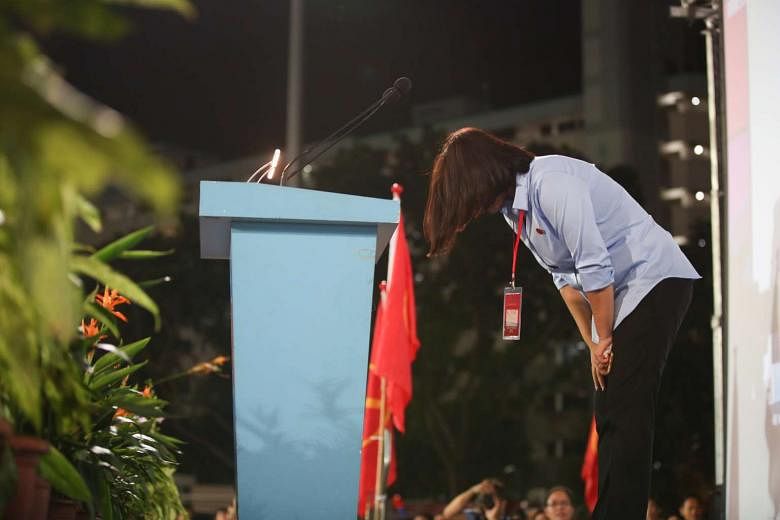Despite the Workers' Party's (WP) longstanding opposition to the Non-Constituency MP (NCMP) scheme, a steady stream of its members have entered Parliament bearing the title.
The opposition party argues that it has to work within the current political system even if it disagrees with certain aspects, and so Dr Daniel Goh will become its eighth NCMP since the scheme was introduced in 1984. He is replacing Ms Lee Li Lian, one of only two WP candidates to have ever turned down an NCMP offer - the other being Mr M. P. D. Nair after the 1984 polls.
But the WP may well have to rethink its approach, after it was outflanked by the ruling party in Parliament over the issue last week.
It filed a motion for Parliament to declare Ms Lee's seat vacant and to have it filled. The House obliged, but not before adding an amendment to formally rebuke the WP for its "political manoeuvre" to transfer the post from one member to another with a lower vote share in last year's September General Election (GE).
People's Action Party (PAP) MPs also repeatedly accused the WP of having no qualms about making full use of the NCMP scheme while attacking it as detrimental to Singapore's long-term political future.
With the minimum number of opposition members in Parliament increasing from nine to 12 after the next GE, the NCMP scheme will be further entrenched.
This means the subject of NCMPs will undoubtedly resurface and the WP needs to refine its strategy in dealing with the topic if it wants to avoid a replay of the harsh scrutiny it came under.
The best solution for the opposition party would be to win 12 elected seats outright, thus rendering the NCMP scheme irrelevant. Such an achievement would mean doubling the six elected seats it has currently, and may seem to be a bridge too far, especially in the light of last year's polls.
Yet, some observers had predicted this exact outcome for GE 2015. They had tipped the WP to retain its seven elected seats then, and add on the hotly contested East Coast GRC and Fengshan single-seat ward, pushing it to the magical number of 12 seats.
To recapture its momentum of old, the WP needs to free itself of a handicap that has hobbled it for too long: its town council's troubled accounts. The sooner it can put right the long-drawn saga over its management of the council, the less the damage might be on its reputation.
After being ordered by the apex court to appoint accountants, the WP-run town council refused to hire one of the Big Four accounting firms, even though the Housing Board offered to pay for the extra costs in hiring a Big Four firm.
While the WP may have felt it was entitled to hire an accountant of its choice, its actions led to an unnecessary prolonging of the saga over the AHTC's financial woes.
A clean set of accounts is critical if the WP is to defend its narrowly-won Aljunied GRC seats while redoubling efforts to win another group representation constituency.
Going forward, the WP also has to take a long and hard look at whether its position of objecting to the NCMP scheme while still taking up such seats is convincing.
It certainly does not have the same resonance as the similar reasoning it employs for contesting in GRCs while opposing their existence.
Why? The GRC system is still seen as disadvantageous to opposition parties like the WP. But it is difficult to make the case that the WP has not gained from the NCMP scheme.
A few PAP MPs have pointed out the most successful graduate of the programme, WP chairman Sylvia Lim, who went from one term as NCMP to becoming an elected MP now on her second term.
The leadership also clearly cares deeply about which of its members take up the post, and last week's motion in Parliament is but one example of this.
After the 2011 polls, the WP central executive council chose Mr Gerald Giam to be the NCMP from its East Coast GRC slate, and was willing to bear the loss of a party veteran when team leader Eric Tan quit the WP as he felt he was the best choice.
The Workers' Party, it seems to me, has two clear choices. Since the WP is unlikely to change its position opposing the NCMP scheme, it can at least make clear that its candidates know they are obligated to take up NCMP seats, even if the party remains officially against the scheme.
This will ensure that its stance does not have to again go under the microscope of a parliamentary debate, triggered by Ms Lee's rejection of the seat this time round.
Alternatively, a bolder approach would be to declare outright that the WP will no longer accept NCMP seats. This would make its position more overtly principled and coherent.
The onus will then also be on the voters to decide if they want elected WP MPs, or no WP MPs at all. Those sitting on the fence may then feel compelled to bite the bullet and cast their ballots for the opposition.
This would dovetail with the party's larger goal of winning at least 12 elected seats, and is also in line with the WP's belief that only elected opposition MPs are good for the long-term political future of Singapore.


